“Down in the meadow where the wind blows free, in the middle of a field stands a lightning tree…”
There are few more evocative 1970s TV themes than the title music from Follyfoot. Combining an unsettlingly rustic folk lyric with joyously choral harmonies and just a soupcon of freewheeling pop magic, it’s the perfect introduction to Yorkshire TV’s popular family drama of the early 1970s. A warm-hearted but frequently wistful tale of a secluded farm that provided a rest home for retired horses, and – indeed – a communal retreat for the gang of teenage misfits that lived and worked there.
The theme was performed by Birmingham-based folk band The Settlers, who – by 1971, when they recorded the song – had already been together for the best part of a decade. Comprising Cindy Kent on vocals, Mike Jones on guitar, John Fyffe on banjo and Mansel Davies on bass (replaced in 1965 by Geoff Srdzinski), they had become familiar figures on both radio and TV, lacing traditional folk music with a beguiling pop sensibility.
Since leaving the band in 1973, Cindy Kent has enjoyed an extraordinarily eclectic career. She became a radio presenter and producer, working for the BBC, LBC, Capitol and Premier Christian Radio, and – since 2008 – has been an ordained priest: the Rev Cindy Kent MBE, no less! After driving listeners to distraction by playing The Lightning Tree repeatedly on my BBC Tees Evening Show, I couldn’t resist attempting to track her down for an on-air interview, and was delighted when she agreed to come on the show. She’s great fun… here’s how the conversation went:

Bob: Tell us about The Lightning Tree… it was a song written by TV producer Francis Essex, who I always assumed must have worked on Follyfoot. But he didn’t… however his brother Tony did!
Cindy: That’s right, it was Tony who was the producer, but he’d obviously shared the idea of the programme with Francis. Francis happened to come along to the Royal Festival Hall in London, where we did our annual concert, and the song that we used to end the show with was an amazing version of Rhythm Of Life, from Sweet Charity. Very much like The Swingle Singers, with that “dobedoo” idea going on in the background! He went home and wrote The Lightning Tree based on our version of Rhythm of Life. And then they got in touch and asked if we’d do it… and well, why not? So we went to London, recorded it… and then thought no more about it, to be honest.
We thought “That’s fine… it’ll happen or it won’t.” And we then went off on a cruise… when I was with The Settlers we’d do a couple of cruises a year, as a kind of paid holiday. And we got a telegram – remember telegrams? – from our manager saying “It’s just entered the charts, you’d better learn it!”
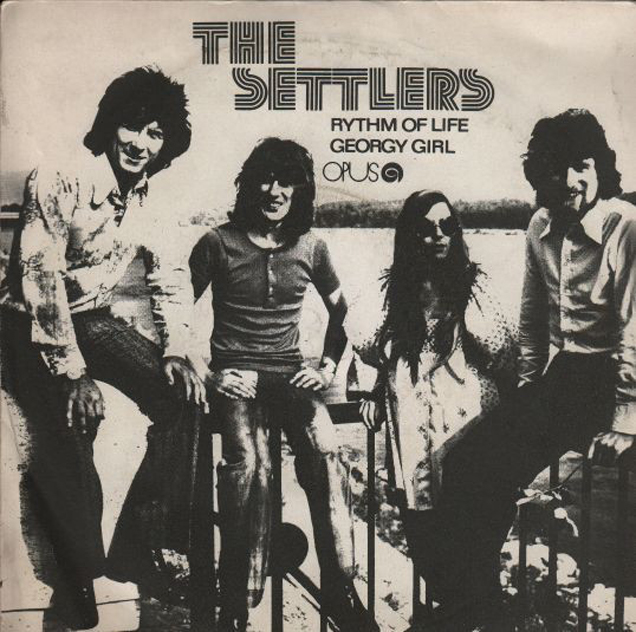
And we thought “Oh, for goodness sake – who’s got the lyrics?”. We were scrabbling around! But people still remember it today. I’m amazed. It’s a long time ago, isn’t it?
I just think how fabulous it is that it was written specifically for you by somebody who’d seen you playing live! What a flattering thing to happen.
We were really flattered, I must admit. This guy was there in the audience, he went home and wrote it, and the rest – as they say – is history.
So did you have much contact with the cast and crew of Follyfoot? You mentioned to me that you came up and did a photoshoot at the farm itself. Was it near Harrogate somewhere?
It was somewhere in Yorkshire! Yes, They took over a farm and had us all sitting in a tree. How they got me up into the branches of a tree I’ll never know, because I’m not very good with heights! But there’s a picture that exists, I think on the Follyfoot website, of the four of us. And then there are pictures with Desmond Llewellyn – Q from the James Bond films – and Steve Hodson, the lead guy; and Gillian Blake, who played Dora. That was our only interaction with them, although I did meet Steve Hodson a few years later, because my late husband was a record producer, and he produced a single with Steve! So we had that connection.

Did you ever see much of the series, or were you always on tour?
I watched a few of them… we were often in transit, though. I think it went out at an odd time, and we were usually travelling to a gig. And, of course, these were they days before we had video recorders. But it went out all over the world… in fact, I did a cruise last year at Easter, as a chaplain, and I met a lady on board who ran a dancing school. And she said – “I’m so pleased to meet you – we worked out a whole routine for The Lightning Tree with our dance group!” It’s the song that keeps on giving, really.
Did you get to see the dance routine?
I’d like to see it! It wasn’t me dancing, that’s for sure… [laughs]
What do you think it is about the song that has made it so enduring?
Do you think it’s maybe the fact that people liked the series? I mean, I love M*A*S*H, and whenever I hear the theme to that, I’m there watching. So it’s that combination… the early 1970s were a fun time to be around, and the song transports a lot of people back to their younger days, of sitting around on an evening watching a nice programme on the telly. It didn’t have anything that your Gran wouldn’t want to watch, and it was well-produced and acted. Just one of those fun things to be part of. I think it’s great that people still remember it, to be honest.
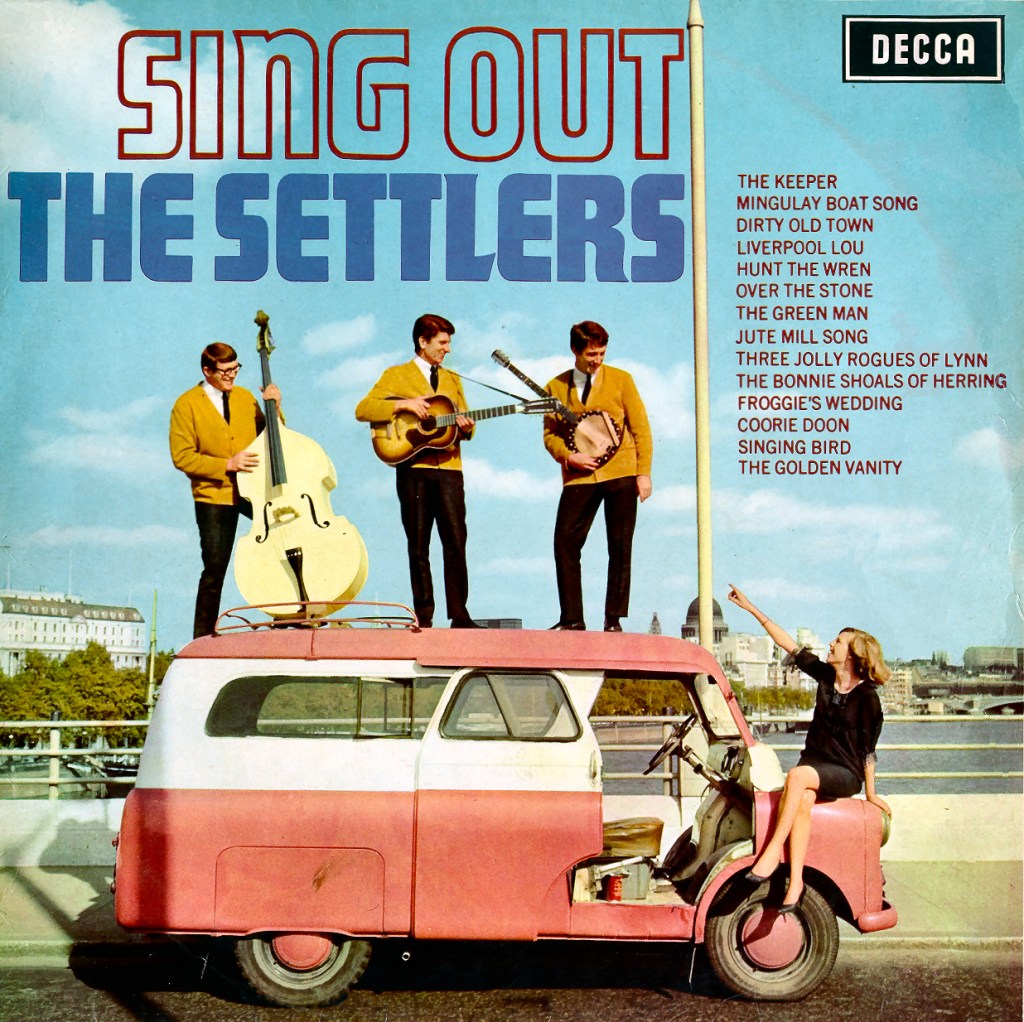
Can I ask about The Settlers as a band… when did you first start, around 1963 or 64?
1963 we started, yeah. Mike and John met at a teacher training college in Birmingham, they were going to be teachers. One of them from Burton-on-Trent, and one from Fleetwood in Lancashire. They met up, started singing in the bar, and then went along to a folk club in Birmingham, near to where I used to live, and got up and did their three or four songs. And at the end of the evening they both came over, and chatted me up! Which was quite fun, really. So we all went off to the local coffee bar, which was what you did in the early 1960s, and they got the guitar out, and I joined in.
I went to a few gigs, and on one occasion they’d done their three or four songs – which was all they had – but the audience was shouting for more, and they called me up onstage and said “Come on – do that song we were messing about with the other night”. What a way to get onstage! So I took my cardigan off and got up… and then they couldn’t get rid of me, really. It was good fun, and we entered a talent competition where we had to have four people, so we got a bass player in, and it went from there.
Were we very fortunate… we won the talent competition, and part of the prize was… you know, getting everything in one place. It was like the kids today with The X Factor: we got a recording contract, a TV audition and a radio audition, all as part of that prize. It was a really good start.
So were you from that folk background as well, then? It sounds like you were going to the folk clubs, too…
I was just there in the audience. I just love live music. I came from a musical family, Dad had a fabulous bass voice and sang in a choir; Mum was a soprano and sang in a local choir, too. My sister was absolutely amazing… not only could she sing and play piano, but she was the youngest member to be admitted into the City of Birmingham Symphony Choir. She was only 16. And so we used to sit around the piano, and singing was second nature. And at the local church, I was always up there singing.
The folk clubs were a natural progression, and were great. You heard some really good stuff. You heard some awful stuff as well to be honest, some people who should never have been let near a stage! But there were people who got up and went on to be really quite famous, and it was a good time to be around. It was when the Beatles and all the Liverpool sound was starting… it was a really creative time, and great to have been part of it.
I was going to ask about that combination of folk and pop music. Obviously the folk scene was hugely healthy at the time, and people like Bob Dylan and Paul Simon were coming over to play at Martin Carthy’s folk clubs in London…
That’s right, it was an emerging sound. People were getting to know it. We, in fact, got hold of Blowin’ in the Wind… somebody had done it in America, but nobody had done it here. We were with Decca Records, and we took it to a guy who was quite famous, Dick James… who turned down lots of people and made lots of mistakes in his musical career! We said “We want to do this as a single,” and he said “Nah, it’s not commercial enough…”
But we were never really a folk group as such. We took folk songs, and made them a bit more poppy… rather than standing there with our fingers in our ears and a glass of beer in the other hand.
You brought a folk approach to pop songs as well. You did a lovely version of The Beatles’ Nowhere Man.
That was a single, yes. That was quite good for us, I remember we did it live on The Morecambe and Wise Show… and I mean live, to millions of viewers. Looking back, it must have been quite terrifying! Yeah, it was a nice song to do, and it suited our three-part harmonies.
How were Eric and Ernie to work with?
Oh, they were just amazing! They used to do lots of rehearsal throughout the day, and almost every time they did a sketch it was slightly different each time. They were honing it, and we just sat there watching.
I’ll always remember… I think we did the Lightning Tree with them as well, and I was wearing a bright red outfit, a see-through skirt with hotpants and a boob tube, and I had long, bright red fingernails, and make-up and all the rest of it, just waiting in the wings to go on. They came off at the end of a sketch, and Eric walked past me and said… “Shouldn’t you go and get changed? You’re on in a minute!” They were just great fun to work with. A brilliantly talented pair.
I love your 1966 single, Till Winter Follows Spring. And I’ve just discovered it was the first lyric you ever wrote!
It was, yeah! Mike, who is sadly no longer with us, wrote a lot of tunes and often wrote the lyrics as well, but on this particular occasion I took the tune away, and… well, listening to it again, I think it stands the test of time a little bit. It’s an eternal theme, isn’t it? Another way of saying “I’ll love you forever.” But yeah, it was a nice one. You’ve brought back lots of memories!
Good! Honestly, it’s a lovely wistful song. Can I ask about some of your other TV work? In 1969, you worked up here in the North-East on a show called Life With Johnny, for Tyne Tees…
Oh my goodness, that really is going back! Yes, Cliff Richard and I went to the same church. And we did a lot of work with him: we did concerts on the continent, and at the Albert Hall, and tours all around the UK… both supporting, and doing our own thing. And he was asked to do a TV series by Tyne Tees, in the religious slot. It took a different parable each week – say, the Good Samaritan. And Cliff played a guy called Johnny, who had three girlfriends – I was one of them, Una Stubbs played another, and there was a lady called Linda Marchal, who you will never have heard of… but you’ll know her by her pen name, which is Lynda La Plante! She played the other girlfriend. We had two weeks each… I was the one that was very serious and wanted to get married and settle down, Una was the one who wanted to spend all his money, and Linda was the nice girl who got him in the end.
Una Stubbs actually sang a song in that show where she mimed to my voice! And I tell you what… it’s the weirdest thing to see someone moving their mouth, and your voice is coming out. It’s almost like you’re dead! I can’t tell you what a very strange feeling that was.
But yes, we did that for Tyne Tees, and we wrote about 30 songs, I think. A guy called David Winter, a clergyman who went on to be head of religious broadcasting for the BBC, wrote all the lyrics and dished them out to the five of us, and each week we’d meet and compare notes. Sometimes we’d put John’s verse to Cliff’s chorus or whatever, and I wrote my very first tune! A song called Love Is More Than Words, which is on Youtube. I was quite pleased with that, it was a love duet that Cliff and I did. That was great, writing all those songs. We had a great fondness for Tyne Tees: lovely people, and a lovely company to work with. They were fabulous to us over the years.
The other curious thing about Life With Johnny: playing Cliff’s dad was William Hartnell, the first Doctor! He didn’t do that much work after leaving Doctor Who in 1966, he wasn’t a well man…
No, I don’t think he was. It wasn’t a very taxing part, but it was nice to have him on there. There was a guy from Coronation Street as well, Mike Baldwin… Jonny Briggs! Several people cropped up in it over the course of the series, and there were dancers opening and closing the show… in fact, if you type Life With Johnny into Youtube, it’s there. How people get hold of these things I don’t know, but new clips seem to appear from time to time. Those were the days!
How’s Cliff to be around?
Yeah, he’s great. We became really good friends over the years: I toured with him, and we did some solo things together. What you see is what you get with Cliff. He’s lovely, and all the problems he’s had just lately… I actually went into court and sat with him. That’s all over, and thank God he’s come out of the other end. That must have taken its toll on him.
But yes, he’s great fun, and wherever we went he was mobbed. He’d land at an airport and there’d be thousands of people there. There’s one lovely little story which I was quite chuffed about: we met up at Manchester airport, the four of us and Cliff and a couple of other people, all going to somewhere in Europe for a concert. And this one guy approached ther group with his autograph book and pen, and Cliff was stood there… and the guy walked straight past him, came up to me, and said “Could I have your autograph, please?”
Cliff didn’t mind at all, but it was very funny!
You were telling me about another TV show called Sing Out, from 1973…
Yes, Sing Out With The Settlers. That was another six-part series, half an hour, and it was us with lots of different people. They’re probably awful, perhaps I’d be better off not seeing them, but it would be so nice if they did exist somewhere! They’ve never turned up on Youtube, and it was in the days before VCR so nobody had a recording of them, but it would be so good to get hold of some, just to have a look. In fact, I don’t know if all of Life With Johnny exists. There’s probably some library somewhere, festering away in a basement…
I have a curious feeling a lot of the Tyne Tees archive is at Teesside University…
I would be indebted to you forever if you could find those!
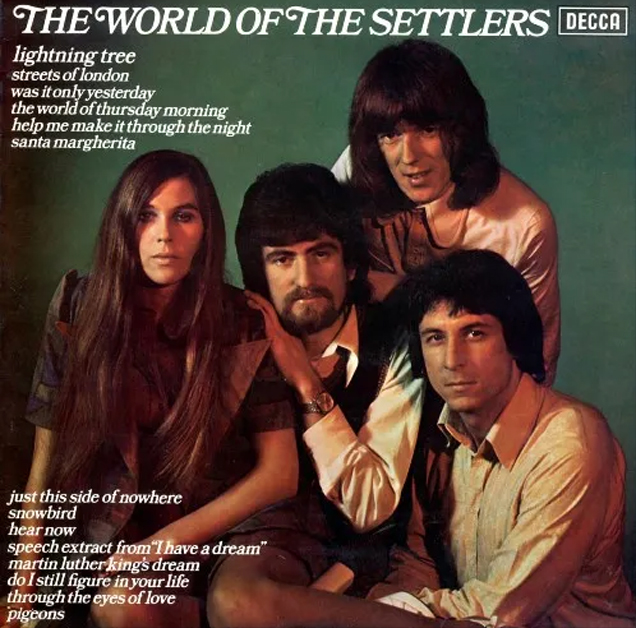
You’ve had a very accomplished career in radio, as a presenter and a producer, did all of that start essentially because you were doing lots of TV and radio work with The Settlers? Did you get a feel for it?
I did… when the Settlers ended in 1973, we all went our separate ways. Mike formed The New Settlers, and that went for about a year with three new people. John decided to move into the pub trade, and he had several pubs, mostly up in the North East. Ending up at the Dunstanburgh Castle Hotel, which is absolutely stunning – half an hour south of Holy Island. Geoff married a Dutch girl and moved to Holland, he became a piano tuner… he had to go back to college, and he loves doing that. He was the most talented musician out of all of us.
And I decided I’d quite like to go into radio. David Winter, who I mentioned earlier, said “Come and do a few things on the Sunday programme” [on BBC Radio 4], so I used to review pop-gospel albums and things. It was a great way of dipping a toe into the water. And then I moved onto my own series, Gospel Road on Radio 2. One of the series was presented with Cliff, and we went around the country discovering new talent. I did a couple of series on Radio 1 too; so I went from Radio 4, to Radio 2, to Radio 1. I’ve never done Radio 3, I must come up with an idea for Radio 3!
And then I was in at the birth of commercial radio, which was absolutely fantastic. I was with LBC, I was with Capital. I was with Radio Hallam in Sheffield doing my own late night show, that was great fun up there. And then Premier Christian Radio, when that first started, they asked me if I wanted to do it – 25 years ago this year! I was the first presenter they ever signed up. It was great fun to be in at the birth of all of that in this country. To try and do something that was different, they way the Americans have done it. And 25 years on, I think we succeeded.
What’s your proudest moment in radio?
Oh my goodness, you should have given me a bit more warning! 9/11… I’m not sure I was proud of it, but I was doing the Afternoon Show. Half an hour before I went on air was when the first plane hit, so we abandoned all the normal music we were going to play and I was there talking to all sorts of people on the screen in front of me, saying, “On Line 4 is somebody from such-and-such a charity, they’ve been working out in New York, and their principal guy is on the phone…” And sometimes, at the end of the interview, I’d just say to the person: “Would you say a little prayer?” Not with all of them, just with some. And I was able to tell our listeners what was going on, because I was getting the feed from IRN and BBC and everything else that was coming in. I was on air for about five hours straight. I’ll never forget that… adjusting what you’ve got in your head, reacting and thinking on your feet.
But the nicest thing was, the next day I got an e-mail from a lady in America who – this is weird, isn’t it – had been listening to a British radio station, to something that was going on in her country, and she just wanted to thank me for getting people to pray. She said it was so lovely to hear other people pray, and all she had to do was say “Amen”. And I treasure that e-mail, it was one of those moments when you just feel that you’re in somebody’s life, and you’re making a difference.
There’s a real responsibility to those moments. I’ve been on air when other big news stories have broken, and there is a feeling of… people are getting this from me, and I’ve got to get it right, and be sensitive and respectful.
You do. I had it with Princess Diana, that was the other one. First thing in the morning… I heard the news at 4am getting out of bed, got into the car to go in, and rang around everyone that I could think of – in some cases breaking the news to them – to record comments. I was in the studio for ages, I was on air for about five hours, drove home about eight hours later, and on the way home I was listening to the radio and suddenly found myself crying. Because it was sinking in that Diana had died. I’d been running on pure adrenaline, and it hit me really hard as I was driving home, thinking “Oh my goodness…”
They actually used to get worried at Premier, when I went, in that something was about to happen. “Check the obits…!” [laughs]
You’re clearly a devoted Christian, and – in fact – are now the Rev Cindy Kent! How did it all happen?
Who’d have thought it, eh? That the girl in a mini-skirt bashing a tambourine would end up being a vicar? There are a few of us… there’s Richard Coles from The Communards, and a couple of others that have gone from being a pop star to being a priest.
Was your faith a big part of your upbringing, then?
I think so, yeah. We always went to chapel from me being a toddler, and it just became part of my life. And at about 15 or 16 it became very personal. I took it on board for myself and just said to God: “OK, here I am… use me, do whatever it is”. And the story unfolded, and went on from there, to me doing what I do now, I guess.
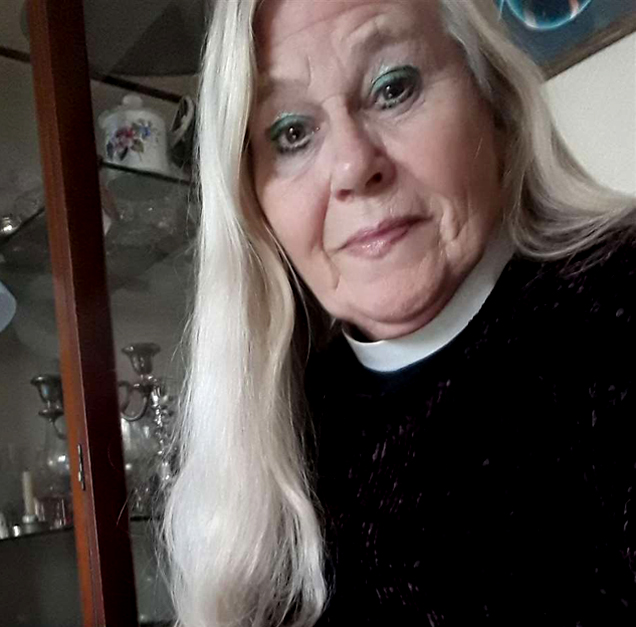
When did you start to feel the pull to actually become a priest yourself?
I don’t know… I woke up one morning and thought “I think I want to be a deacon”, which was the first stage in those days. And then I rang up my local bishop, who I knew really well because I’d used him on Capital Radio, and said “I think I’m being called to be a deacon… but I’m not really sure what that is!”
And he said “Ah, I’ve been expecting this!” I said: “Oh, really? I haven’t!”
So you go forward to a selection conference, and you have to pass exams, and I mean… I was dreadful as a child at school, so the thought of doing anything academic filled me with the screaming ab-dabs. But by the grace of God I got through it, and ended up being ordained, and yeah… it was really good. It’s been a great journey: I had my own church in North London for six years, and then I retired and moved to the Isle of Sheppey, nearly four years ago.
And have you stayed in retirement?
No, don’t be daft! It’s nice to be able to do things, and when I came down here I got what they call “permission to officiate”… which means that you do the job, but you don’t get paid! So I help out at the local church, doing services and things, which is lovely. If I’m going to be at the service anyway, I might as well lead it. I’ve met a load of people, made some great friends, and I’ve got the sea at the bottom of my garden. I sit watching it from my living room. Well… it isn’t really the sea, it’s the end of the Thames, but we don’t mention that!
But there are boats and ships going up and down all day, the tide goes in and out… it’s just the most idyllic place, and I absolutely love it. But if you’d told me, back in 1900-and-frozen-to-death, that this is what I’d be doing in 2020, I would have gone “What?!!!”
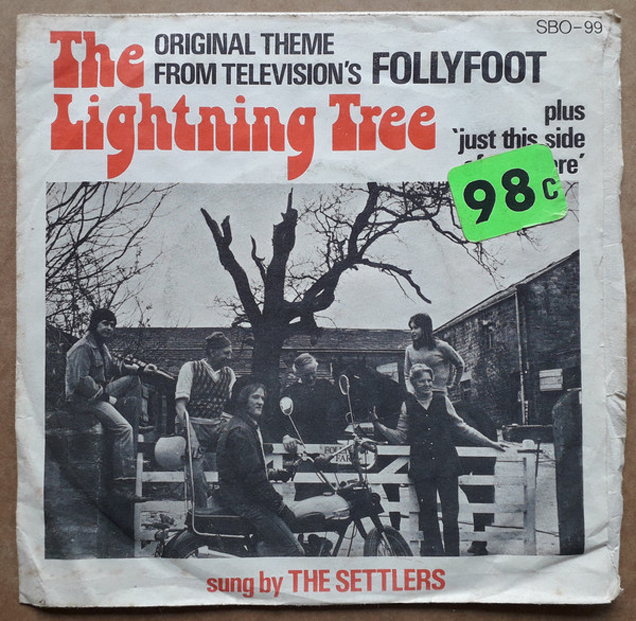
And are you still singing live?
I do the odd gig locally, yeah. We’ve done a couple at the beautiful little theatre here on the island, the Criterion, and that’s great. And of course I teach people the chorus of The Lightning Tree – not that you have to really teach it, they seem to know it – and they all join in. The worst thing about that song, though, is that all five verses begin with the same words: “Down in the meadow where…” something happens. And it’s a case of trying to remember which one you’re on! [laughs] I’m constantly singing “Down in the meadow where… mumble mumble mumble…” What happens next? I don’t know!
I’m going to play some more Settlers to finish… can I play Major to Minor, from 1967?
Oh my goodness, Tony Hatch produced that! It was Kenny Everett’s favourite record of the year when it came out. Great lyrics, it was a very clever song that Tony Hatch wrote, he was our producer at the time. It’s a shame it wasn’t a proper hit, it was what they call a “turntable hit”… everybody played it and loved it, it just didn’t sell! But it is a good song, and a nice one to close with…
Thanks so much to Cindy for her time, and for being such a good sport. You can say hello to her on Twitter, she’s here…